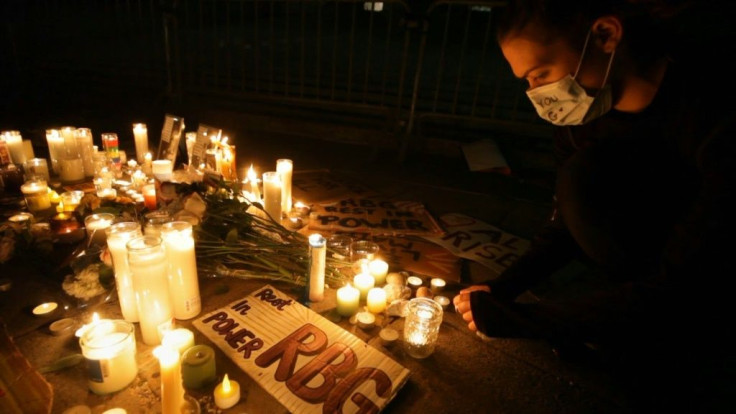What A Third Appointment By President Trump Would Mean To Supreme Court Following Death Of Ruth Bader Ginsburg
KEY POINTS
- Trump said he plans to nominate someone to fill Ginsburg's Supreme Court seat shortly after her funeral
- If Trump nominates a third justice to the high court, it would cement a conservative majority for a generation
- Senate Judiciary Chairman Lindsey Graham said the rules changed after the confirmation hearing for Brett Kavanaugh
President Trump said Monday he would delay nominating a replacement on the U.S. Supreme Court for Justice Ruth Bader Ginsburg until after her funeral later this week to “get it over with,” even though the action still would violate the women’s rights icon’s final wishes.
Ginsburg, 87, died Friday night of pancreatic cancer. Reports said she had told her granddaughter she wanted the next president to nominate her replacement just days before her death, but both Trump and Senate Majority Leader Mitch McConnell have said they plan to ram a nomination through before the end of the year – possibly before Election Day, Nov. 3.
“Out of respect we will delay the nomination,” Trump said on Fox News, adding he expected the funeral to take place by Friday.
Visitation for Ginsburg was scheduled for Wednesday and Thursday at the Supreme Court. She was then scheduled to lie in state at the Capitol on Friday. A private interment ceremony was set for next week at Arlington National Cemetery.
A Trump appointment would cement a conservative majority for a generation and could spell an end to reproductive rights. Also at stake are the power of the presidency, immigrant rights, tax rules and healthcare.
It would leave Justices Sonia Sotomayor and Elena Kagan as the only two liberals, with Stephen Breyer considered a liberal-leaning moderate and Chief Justice John Roberts seen by conservatives as not always reliable.
Trump already has made two appointments to the court, Neil Gorsuch and Brett Kavanaugh. Gorsuch was a replacement for Antonin Scalia, a strict constructionist, but Kavanaugh replaced Anthony Kennedy, who often sided with the liberal justices.
The timeline proposed by Trump and McConnell has outraged Democrats and others because the election is just 43 days away. When Scalia died in February 2016, the election was 200 days away and McConnell refused to give President Barack Obama’s nominee a hearing, saying it was too close to the election to fill the high court vacancy.
“You can’t keep a democracy if there’s one set of rules for one group and another set for everybody,” said former President Bill Clinton, who nominated Ginsburg to the court. “We do actually need to live under the same set of rules.”
President Bill Clinton: "You can't keep a democracy if there's one set of rules for one group and another set for everybody else." pic.twitter.com/O983kC9RkO
— The Hill (@thehill) September 21, 2020
He characterized McConnell’s position as hypocritical.
Two Republicans – Sens. Lisa Murkowski of Alaska and Susan Collins -- already have said they do not support rushing to fill the vacancy. Two more Republicans would have to take that position, possibly Mitt Romney of Utah, who voted in favor of Trump’s impeachment, and Cory Gardner of Colorado, who is in a tight race with popular moderate former Gov. John Hickenlooper.
Democratic presidential nominee Joe Biden said McConnell made up a rule in 2016 to block the nomination of Appellate Judge Merrick Garland. He noted Judiciary Chairman Lindsey Graham agreed at the time. This time, Graham said the situation is completely different.
“After Kavanaugh, the rules have changed as far as I'm concerned,” Graham told NBC News last month, referring to the contentious debate over the justice’s nomination.
I stand by what I said in Jan. 2019: Harry Reid & Chuck Schumer changed Senate rules to try and stack the courts for Obama. Now it's coming back to haunt them as I predicted. I'm dead set on confirming @realDonaldTrump’s nominee. If you stand with me: https://t.co/MYF6qgyjdI pic.twitter.com/lsejlSs0QQ
— Lindsey Graham (@LindseyGrahamSC) September 19, 2020
“We knew basically they were lying in 2016, when they said, ‘Oh, we can't do this because it's an election year.’ We knew they didn't want to do it because it was President Obama,” Sen. Tim Kaine, D-Va., told NBC.
Trump told Fox he has five finalists on his list and would like to see a vote before the election. He said he doesn’t believe reports Ginsburg wanted her seat left vacant until after the inauguration.
“I don’t know that she said that, or was that written out by Adam Schiff and [Senate Minority Leader Chuck] Schumer and [House Speaker Nancy] Pelosi,” Trump said. “I would be more inclined to the second. ... But that sounds like a Schumer deal or maybe a Pelosi or Shifty Schiff.”
He added: “We have the presidency and the Senate and we have plenty of time. I think that would be good for the Republican Party and I think it would be good for everybody to get it over with.”
(Updated at 12:27 p.m. EDT)

© Copyright IBTimes 2024. All rights reserved.






















